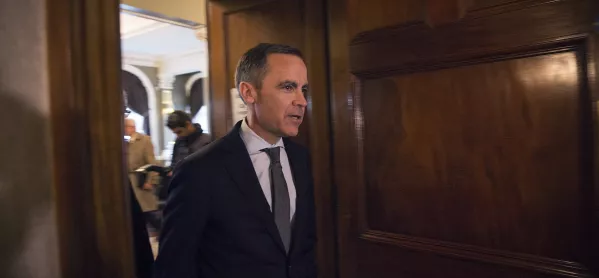- Home
- Mark Carney: Economics isn’t boring or complicated
Mark Carney: Economics isn’t boring or complicated

Economics is boring. It’s dry. It’s complicated. It’s irrelevant. Worse still, economists are out of touch, geeky, aloof. Economics is not for people like me.
These are just some of the many charges levelled against the dismal science and its masters.
Well it won’t surprise you to know that I disagree.
On your way into school this morning, did you buy a coffee? Latte or filter? Did you choose a smaller size but add an extra shot? Did you use your reusable cup or loyalty card to get a discount? Why didn’t you get a tea? Or make it at home?
Sourcing a caffeine hit was a simple morning activity, where you applied some economic reasoning. You weighed up the costs against the benefits in light of different incentives and your preferences to make the best choice for you. We’ll make an economist of you yet.
You can’t ignore economics
Economics is not an abstract science. It is for the everyday. You may try to ignore me or the Bank of England, but you can’t ignore economics.
People agree about its importance: over three-quarters of those surveyed in a poll believe that economics should be taught in schools. Yet, last year, less than 0.1 per cent of all GCSE and 4 per cent of all A-level students took economics.
And economists remain too uniform a bunch. Under a third of A-level students and undergraduates are female. Women account for just a quarter of all academic staff in UK economics departments. What’s more, over a fifth of economics undergrads are from private schools, despite private school students being just 7 per cent of the student population.
This is a problem - above all, of missed opportunities for students but also of missed opportunities for the economics profession. This is a “scandal”, according to broadcaster Robert Peston, speaking at an event at the Bank last week, and the “biggest failure of all” in the eyes of Lucy Kellaway, Financial Times columnist-turned-maths teacher.
I agree with them. Which is why the Bank is doing something about the poor uptake in economics education. The event I’m referring to is last week’s launch of the Bank of England’s education outreach - our contribution to starting to right these wrongs.
The reason we’ve created lesson plans, videos, materials and games - called ”econoME” - is to demystify economics for young people. To help them understand the world around them and the Bank’s role. To equip them with the skills to make important financial decisions. To inspire them, a more diverse group of young people, into economics, finance and business.
The education outreach programme will dispel the dismal science critique.
Economics is not boring. The economy and the Bank’s decisions affect every UK citizen whatever their age, wherever they live. The materials explain the different parts of the economy and the broad reach of economics. And broad it is. Our colleagues are currently working on issues such as the impact of artificial intelligence on the future of work, the role of the financial system in combatting climate change, and the value of diversity in decision making. A quick visit to our Bank Underground blog reveals articles on the impact of mental health, crypto-currencies and driverless cars on jobs, growth, inflation and wellbeing.
Economics is not complicated. As John Maynard Keynes, one of the discipline’s greats, observed, “the study of economics does not seem to require any specialised gifts of an unusually high order”, The econoME materials are free, don’t require any economics know-how to be taught and have been developed with teachers and accredited by both the PSHE Association and Young Money.
Economics is not exclusive. As 200 of my colleagues head out to schools this year, they will not only educate but also inspire. They will show young people that it takes all sorts to become an economist and that the Bank takes diversity seriously. After all, if someone like me, born in the Arctic and educated at state schools, can become governor of the Bank of England, why can’t they?
It takes just a stimulating lesson, an inspiring teacher or a role model to spark a child’s imagination and interest in economics and set them on a path to becoming the business leader or economist of the future. We hope the education outreach programme will do just that and, in the process, help the Bank deliver its mission to promote the good of the people of the United Kingdom.
Mark Carney is governor of the Bank of England
Keep reading for just £1 per month
You've reached your limit of free articles this month. Subscribe for £1 per month for three months and get:
- Unlimited access to all Tes magazine content
- Exclusive subscriber-only stories
- Award-winning email newsletters